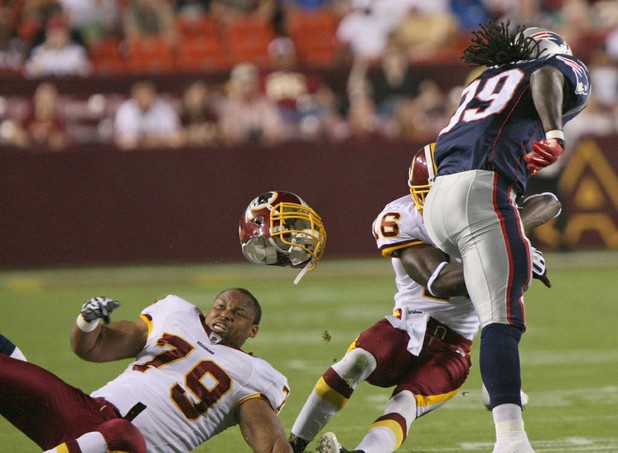- Story Highlights
-
- NFL: Players worried about the lasting damage caused by frequent concussions
Concussion Worries Temper This Year’s Super Bowl Excitement
NFL players are 19 times more likely to suffer early Alzheimer’s - Can the NFL protect its players from concussion through rule changes?
While most eyes will watch the play and the scoreboard tomorrow evening, some experts viewing tomorrow’s Super Bowl will be watching with concern for certain kinds of hits that start from the head and that leave a player seeing stars – or worse.
Ex NFL players experience traumatic brain injury at rates far above the general population; neural injuries that most believe occur as a result of the concussions that many if not most players experience throughout playing careers that can span decades.
- Dallas Clark has had 4 major concussions as an NFL player
- Anthony Hargrove of the Saints has had multiple concussions throughout his career
An NFL commissioned study shows that ex NFL players between the ages of 30 and 49 are 19 times more likely to suffer from Alzheimer’s or other dementia like disorders than men from the general population. Those with a history of concussions seem most at risk of thee memory diseases.
Rule Changes to Protect Players
While many around the league previously thought that concussions were a concern only if collisions led to a loss of consciousness, a rule change this year means that players who suffer a hit to the head and who have temporary cognition problems, lasting headache, any gap in memory or any dizziness must sit out the remainder of the game.
The NFL now takes concussions very seriously (although they have faced great criticism for how head injuries were handled until very recently) but convincing players of the import of brain safety is another thing altogether.
Toughness Culture
Many players say that they feel they must go out and play every down they possibly can to safeguard their livelihood, lest someone else come in, play well, and take their position. Additionally, an enduring toughness culture in the league has long held in esteem those who ‘shake off’ injuries, including head injuries, to get the job done on the field for the team.
Earlier this season Steelers receiver Hines Ward was publically critical of quarterback Ben Roethlisberger for sitting out a game after a concussion
While the effects of major concussions aren’t easily hid, minor, more frequently experienced concussions may cause only seconds of dizziness or blackness. By regulation, a player who has experienced such a concussion should leave the field, but in reality, many players are reluctant to admit to something that will have them benched.
While getting payers to admit to small but still serious concussions remains a challenge, there are many in the game that take the issue very seriously. Colt quarterback Payton Manning commented on the issue, saying, "I'm very aware of the players of yesteryear who are struggling physically, mentally, so it's a very serious deal. I think current players are realizing just how serious."
Research Findings
With the NFL newly serious and ready to change the way the game is played, if necessary, to protect the health of the league’s players, all eyes are on researchers like Kevin Guskiewicz out of the University of North Carolina at Chapel Hill, to hopefully provide some clarity and solutions.
Guskiewicz has enrolled 3000 ex NFL players in a study to look for brain scarring and swelling in certain areas of the brain (the same regions of the brain that show damage in early Alzheimer’s patients). He thinks that he’ll find the physical evidence of years of hard hitting that’s putting players at such an elevated risk – and with an understanding of exactly where the damage occurs, maybe gain an understanding of what can be done to prevent such neural damage.
In separate research, doctors at the Center for the Study of Traumatic Encephalopathy at Boston University School of Medicine have persuaded more than a dozen ex pro players to donate their brains to science after death, to help medical researchers get a better understanding of the physical damage concussions can cause in the brain.
Among those who’ve pledged to help include former Dolphins star Zach Thomas, who explained his reasoning, saying, “The scientific findings to date are clear that repetitive trauma to the head results in [chronic traumatic encephalopathy] in many athletes. I want to do my part to help the researchers understand this disease and to discover treatments and an eventual cure.” His goal, he says, is to ensure the survival of a game he loves.

